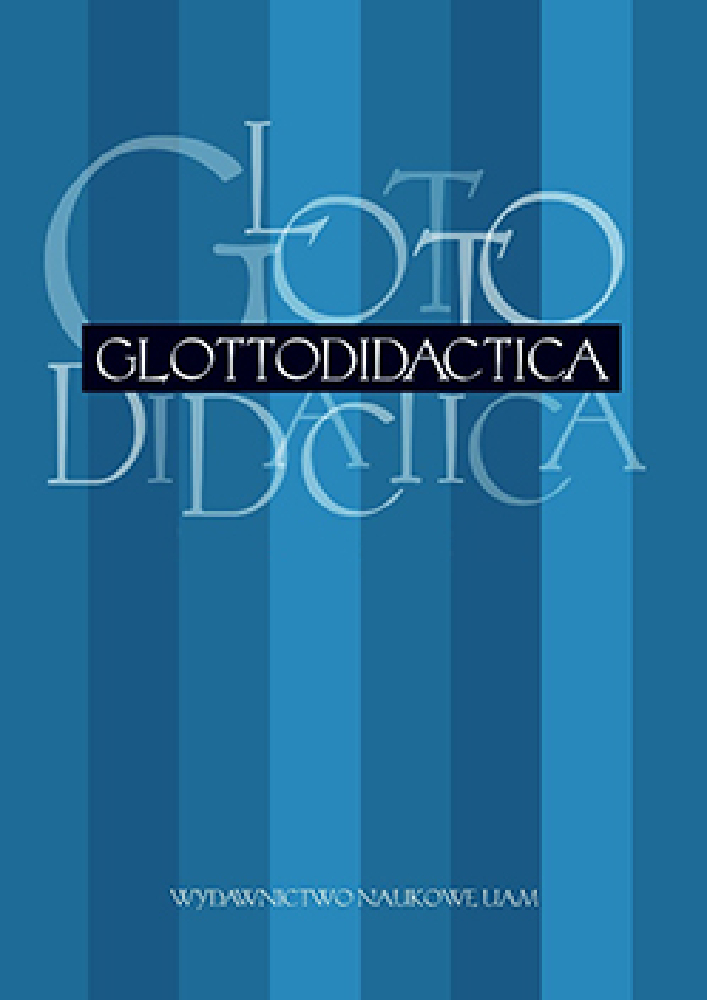Abstract
A significant contribution to broadening and deepening the field of glottodidactics is made, inter alia, by the results of codematic and cybernetic research. Within the glottodidactic system, the following processes can be identified: 1) the encoding of information by the primary sender (the instructor), 2) the sending of information and its linguistic and extralinguistic monitoring to the primary receivers (learners), 3) the reception and decoding of information by the primary receivers, and the construction of matrices of new lexical and grammatical structures, 4) the encoding of information by the secondary sender (the learner), 5) the sending of information to the secondary receiver (the instructor) within a feedback system, 6) the reception of information by the secondary receiver, its checking and correction, the regulation and syntactic ordering and renewal of the glottodidactic process.
Literaturhinweise
Ashby, W.R. (1974). Einführung in die Kybernetik. Frankfurt (a. M.): Suhrkamp Verlag.
Bausch, K.-R. (1993). Zur Frage der Tauglichkeit von ‚Steuerung‘ und ‚Offenheit‘ für den eigen- ständigen Wirklichkeitsbereich, Lehren und Lernen von Fremdsprachen‘. In: K.-R. Bausch, H. Christ, H.-J. Krumm (Hrsg.), Fremdsprachenlehr- und -lernprozesse im Spannungsfeld von Steuerung und Offenheit. Arbeitspapiere der 13. Frühjahrskonferenz zur Erforschung des Fremdsprachenunterrichts (S. 7–17). Bochum: Universitätsverlag Dr. N. Brockmeyer.
Birjukov, B.V., Geller, E.S. (1987). Informatik und Kybernetik in nichttechnischen Prozessen. Berlin: Akademie-Verlag.
Bleyhl, W. (1993). Nicht Steuerung, Selbstorganisation ist der Schlüssel. In: K.-R. Bausch, H. Christ, H.-J. Krumm (Hrsg.), Fremdsprachenlehr- und -lernprozesse im Spannungsfeld von Steuerung und Offenheit. Arbeitspapiere der 13. Frühjahrskonferenz zur Erforschung des Fremdsprachenunterrichts (S. 27–42). Bochum: Universitätsverlag Dr. N. Brockmeyer.
Burkart, R. (1983). Kommunikationswissenschaft. Wien, Köln: Böhlau Verlag.
Christ, H. (1993). Die Dialektik von Steuerung und Offenheit. In: K.-R. Bausch, H. Christ, H.-J. Krumm (Hrsg.), Fremdsprachenlehr- und -lernprozesse im Spannungsfeld von Steuerung und Offenheit. Arbeitspapiere der 13. Frühjahrskonferenz zur Erforschung des Fremdsprachenunterrichts (S. 53–57). Bochum: Universitätsverlag Dr. N. Brockmeyer.
Cube von, F. (1968). Kybernetische Grundlagen des Lernens und Lehrens. Stuttgart: Ernst Klett Verlag.
Flechtner, H.-J. (1966). Grundbegriffe der Kybernetik. Stuttgart: Wissenschaftliche Verlagsgesellschaft M.B.H.
Haseloff, O.W. (1964). Einige Hypothesen zur Struktur von Lernprozessen. In: K. Steinbuch, S.W. Wagner (Hrsg.), Neuere Ergebnisse der Kybernetik. Bericht über die Tagung Karlsruhe 1963 der Deutschen Arbeitsgemeinschaft Kybernetik (pp. 15–18). München, Wien: R. Oldenbourg Verlag.
Klaus, G., Liebscher, G. (1974). Systeme, Informationen, Strategien. Eine Einführung in die kybernetischen Grundgedanken der System- und Regelungstheorie, Informationstheorie und Spieltheorie. Berlin: VEB Verlag Technik.
Klix, F. (1980). Information und Verhalten. Kybernetische Aspekte organischer Informationsverarbeitung. Einführung in naturwissenschaftliche Grundlagen der Allgemeinen Psychologie. Berlin: VEB Deutscher Verlag der Wissenschaften.
Robra, K. (1996). Zur Theorie der (Fremd-) Sprache(n) und des Fremdsprachen-Unterrichts (FU). Fremdsprachen und Hochschule, 47, 10–14.
Schnabl, H. (1972). Sprache und Gehirn – Elemente der Kommunikation. Zu einem kybernetischen Modell der menschlichen Nachrichtenverarbeitung. München: Wilhelm Goldmann Verlag.
Schröder, H. (1975). Kommunikation und Information im Unterricht. KG-München: Franz Ehrenwirth Verlag.
Solmecke, G. (1993). Steuerung und Offenheit in der methodischen Gestaltung von Fremdspra- chenunterricht. In: K.-R. Bausch, H. Christ, H.-J. Krumm (Hrsg.), Fremdsprachenlehr- und -lernprozesse im Spannungsfeld von Steuerung und Offenheit. Arbeitspapiere der 13. Frühjahrskon-ferenz zur Erforschung des Fremdsprachenunterrichts (S. 155–160). Bochum: Universitätsverlag Dr. N. Brockmeyer.
Szczodrowski, M. (2020a). Glottodidaktische Steuerung und Regelung auf interindividueller Ebene. DOI: https://doi.org/10.14746/gl.2020.47.2.09
Glottodidactica. An International Journal of Applied Linguistics, 27,2, 195–203.
Szczodrowski, M. (2020b). Intraindividuelle Verarbeitungsprozesse des fremdsprachenunterricht- lichen Stoffes: Ihre Besonderheiten und Auswirkungen. In: S. Chudak,M. Pieklarz-Thien (Hrsg.), Die Lernenden in der Forschung zum Lehren und Lernen fremder Sprachen (S. 157–164). Berlin et al.: Peter Lang.
Szczodrowski, M. (2021). Zur Entwicklung der kodematischen Theorie des fremdsprachenunter- richts. Glottodidactica. An International Journal of Applied Linguistics, 48, 2, 95–109. DOI: https://doi.org/10.14746/gl.2021.48.2.06
Szczodrowski, M. (2022). Fremdsprachliche Übertragungskanäle: Ihre Arten und Funktionen. Studia Niemcoznawcze, 67, 275–283.
Szeluga, A. (2019). Was kann moderne Linguistik für die Fremdsprachendidaktik leisten? Forum Filologiczne Ateneum, 1, 213–226. DOI: https://doi.org/10.36575/2353-2912/1(7)2019.213
Wode, H. (1993). Linguistik. Eine Einführung in die Lehr- und Lernbarkeit von Sprachen. Theorien, Methoden, Ergebnisse. Ismaning: Max Hueber Verlag.
Zabrocki, L. (1961). Sprachkode. Zeitschrift für Phonetik, allgemeine Sprachwissenschaft und Kommu- nikationsforschung, 14, 64–73. DOI: https://doi.org/10.1524/stuf.1961.14.14.64
Zabrocki, L. (1966). Kodematische Grundlagen der Theorie des Fremdsprachenunterrichts. Glot- todidactica. An International Journal of Applied Linguistics, 1, 3–42. DOI: https://doi.org/10.14746/gl.1966.1.01
Zabrocki, L. (1975). Kybernetische Modelle der sprachlichen Kommunikation. Wrocław et al.: Zakład Narodowy im. Ossolińskich, Wydawnictwo Polskiej Akademii Nauk, Komitet Neofilologiczny.
Lizenz
Copyright (c) 2023 Marian Szczodrowski

Dieses Werk steht unter der Lizenz Creative Commons Namensnennung - Keine Bearbeitungen 4.0 International.
Authors
Authors of texts accepted for publication in Glottodidactica are required to complete, sign and return to the editor's office the Agreement for granting a royalty-free license to works with a commitment to grant a CC sub-license.
Under the agreement, the authors of texts published in Glottodidactica grant the Adam Mickiewicz University in Poznań a non-exclusive, royalty-free license and authorize the use of Attribution-NoDerivatives 4.0 International (CC BY-ND 4.0) Creative Commons sub-license.
The authors retain the right to continue the free disposal of the work.
Users
Interested Internet users are entitled to use works published in Glottodidactica since 2016, under the following conditions:
- attribution - obligation to provide, together with the distributed work, information about the authorship, title, source (link to the original work, DOI) and the license itself.
- no derivatives - the work must be preserved in its original form, without the author's consent it is not possible to distribute the modified work, such as translations, publications, etc.
Copyrights are reserved for all texts published before 2016.
Miscellaneous
Adam Mickiewicz University in Poznań retains the right to magazines as a whole (layout, graphic form, title, cover design, logo etc.).





